Physical Address
304 North Cardinal St.
Dorchester Center, MA 02124
Physical Address
304 North Cardinal St.
Dorchester Center, MA 02124

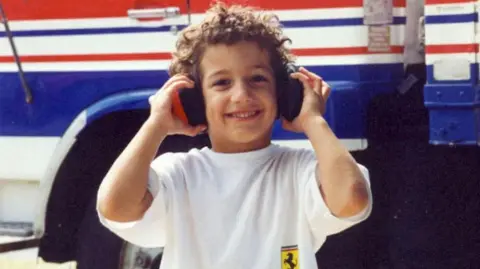 Facebook
FacebookAs always, the Australian Grand Prix in 2006 was an eclectic buffet of fame and power – with everyone from actress Amanda Bynes to the Dutch Prime Minister, a 70s pop star, and the original Blue Wiggle treading pit lane.
Unnoticed in a corner, making small talk with Italian driver Jarno Trulli and former Miss Universe Jennifer Hawkins, was none other than 16-year-old Daniel Ricciardo.
The Perth boy had won a pass to the race – having been crowned Australian go-karting champion the year before – and on that day in April his world shifted.
Family friend and then mentor Remo Luciani jokes it was meeting Hawkins that did it: “He was practically drooling.”
But while rubbing shoulders with Formula 1 stars and feeling the rumbling roar of their engines, the shy teen got his first real taste of the life he was doggedly chasing.
“I think he saw the picture – ‘this is where I belong, this is what I want to do’,” Luciani tells the BBC.
Fast forward a few years and he’d not only become part of that world, but “a main character” in it.
But after 13 years in the sport – with an impressive 257 races, 32 podiums, and eight wins – his F1 career came to an end last week, after Red Bull dropped him from its team.
He bows out as one of the most successful and popular drivers on the circuit and the golden boy of Australian motorsport.
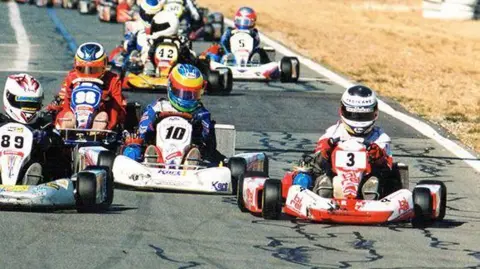 Coopers Photography
Coopers PhotographyFrom the moment his motorsport-mad father let him on a go-kart track as a nine-year-old, Ricciardo has been making an impression.
“There’s those who get it at that age, and those that don’t, and he got it pretty quickly,” Tiger Kart Club stalwart John Wishart says.
Ricciardo didn’t blow the competition out of the water, but he quickly established himself as a fast but fair rival, with an infectious personality and fierce competitive spirit – a reputation he’s hung on to his entire career.
“What you see on the TV of Daniel today, he was exactly the same as a kid,” childhood friend Lewis Shugar tells the BBC.
“He was always laughing and having a good time, and if things didn’t go right for him, he still had a smile on his face,” Wishart says. “That in itself is a special talent.”
As he started to notch up race wins around Western Australia, chatter of his promise spread to the east coast.
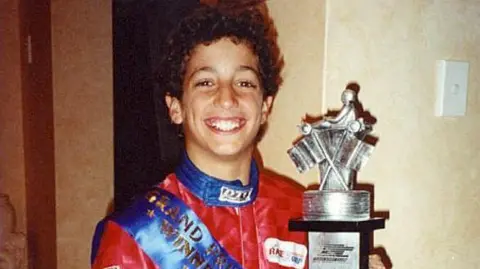 Daniel Ricciardo
Daniel RicciardoRicciardo soon joined Remo Racing – a self-styled development squad run by Luciani in Victoria.
“He was a very, very quick learner, and he was determined. He wanted to always go faster. I could see the hunger in him,” says Luciani – himself a karting legend and Australian Motorsport Hall of Fame inductee.
Ricciardo won his first race with the team in 2005 and went on to take out the national go-karting championship that year, while also racing Formula Ford cars in his home state.
And with that, he was on his way overseas – a “big move” that Ricciardo has said “changed everything”.
Each passing year brought a new step up the ladder. In 2006 he raced in Asia, before moving to Italy the year after, then signing to the Red Bull development programme as a “shy” and “immature” 18-year-old in 2008.
“Having that responsibility, that pressure, all of that, it forced me to grow up,” he told CNN Sport earlier this month.
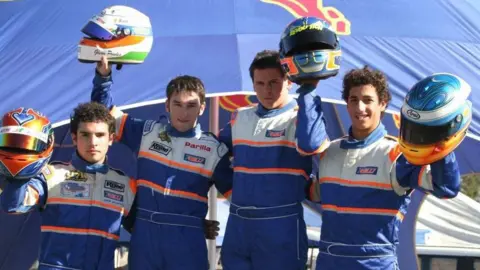 Remo Racing
Remo RacingIn 2011 he made his long-awaited grand prix debut at Silverstone, on loan to Spanish team HRT, thrilling his supporters back home.
One described him as beating one-in-10-million odds.
“Just to sit in an F1 car is something that hardly anybody will ever do – so even just to have that opportunity is incredible,” Shugar says.
But Ricciardo wasn’t satisfied with just any spot on the grid, and by 2014 he’d earned a call up to the main Red Bull team, replacing fellow countryman Mark Webber.
“I’m ready,” Ricciardo declared at the time: “I’m not here to run around in 10th place.”
True to his word, he won three races that year, outperforming teammate and defending champion Sebastian Vettel.
Over his four years at Red Bull, he became known as the Honey Badger – for the affable demeanour which belied his killer racing instincts.
“His trademark was these terrific late-braking moves that would catch drivers by surprise,” Australian F1 journalist Michael Lamonato told the BBC.
“He always said he wanted the kind of reputation that meant he would be feared when another driver would see him in their mirrors, and I think he really achieved that.”
At the same time, his popularity off the track was soaring, even before the hit Netflix series Drive to Survive took F1 to new levels of acclaim.
“Daniel was one of the characters that was beginning to transcend the sport,” Lamonato says.
His signature shoey celebration – which is credited with popularising the practice in Australia – memeable media sound bites and humorous stunts have enamoured him to legions the world over.
“He seems like a mate, someone you could make friends with at the pub,” Melbournian fan Issy Futcher says.
“He’s made for this kind of stardom.”
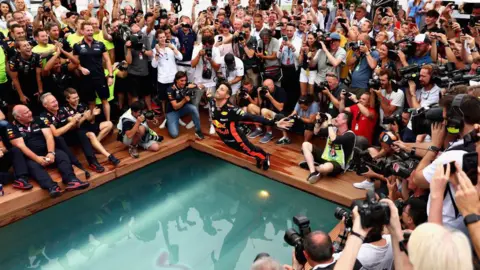 Getty Images
Getty ImagesThe pinnacle of his career came with a gutsy win in Monaco in 2018, when he defended his lead for 50 laps while battling a failing engine, two years after a botched pit stop at the same circuit saw victory slip through his fingers.
“This was a redemption race… it really is his defining win,” Lamonato says.
But after ill-fated moves to Renault in 2019 and McLaren in 2021, where he struggled to replicate his previous success, he was left floundering in 2023 and returned to the broader Red Bull fold as a reserve driver.
He re-joined the starting line-up in its junior team – now called RB – halfway through the season though was soon derailed by a broken wrist and his form never recovered throughout 2024.
Rumours began to circulate and when the Singapore Grand Prix rolled around on 22 September, the writing was on the wall. In one last hurrah, Ricciardo was given a fresh set of tyres and set the fastest lap of the race.
After finishing last, the 35-year-old lingered in the cockpit for a beat.
In a teary post-race interview, Ricciardo said he was battling a lot of emotions.
“I’m aware it could be it,” he said. “I just wanted to savour the moment.”
He had only wanted to return to the grid if he could get podiums and so was “at peace” with his impending fate, he told Sky Sports.
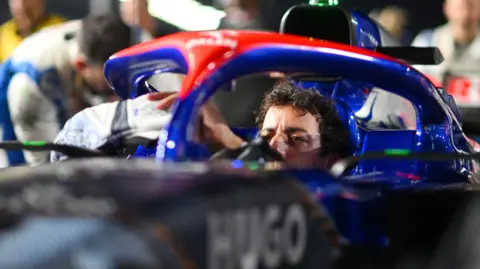 Getty Images
Getty ImagesDays later, Red Bull confirmed he would be replaced for the rest of the season by young Kiwi Liam Lawson – news that stirred outrage and cries of mistreatment.
Team boss Christian Horner said Ricciardo’s statistics and accolades weren’t the only measure of his success.
“From the moment you arrived at Red Bull it was obvious you were so much more than just a driver. Your constant enthusiasm, sense of humour and attitude will leave an indelible legacy,” he said.
Amid a wave of tributes from his peers, Ricciardo said it had been a “wild and wonderful” journey.
“I’ve loved this sport my whole life… It’ll always have its highs and lows, but it’s been fun and truth be told I wouldn’t change it,” he wrote on Instagram.
“Until the next adventure.”
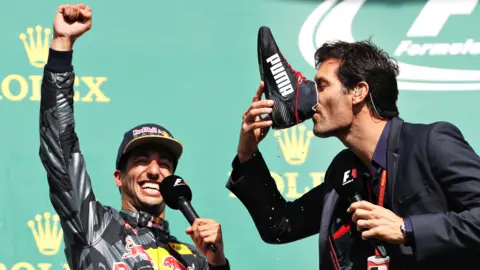 Getty Images
Getty ImagesWhile details of that next adventure are hotly anticipated, Lamonato says Ricciardo has already cemented himself as one of the most underrated F1 drivers.
“The best way to sum up Daniel Ricciardo is a driver of immense potential who suffered what so many do, and that is career wrong turns.”
His long career is near unmatched – only nine drivers have started more races – and his wins and podiums both put him in the top 40 drivers of all time, particularly impressive when factoring in that all were achieved without racing for the dominant team of the day.
And his legacy is already stamped at home in Australia – where karting figures say he’s inspired both an increase in grassroots participation and the next wave of Australian racing stars like Oscar Piastri and Jack Doohan.
Statistically, Ricciardo will be the fourth most successful Australian to have raced F1, but many think he’ll be remembered as the greatest.
“I don’t think anyone will have had an effect similar to him in terms of bringing the sport home to the audience,” Lamonato says.
“[He] did Australia proud,” Luciani concludes.